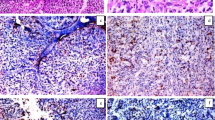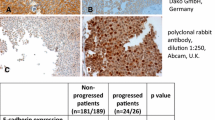Abstract
Bladder cancer is a major health problem. The limitations of poor sensitivity of cytology and the invasiveness of cystoscopy have generated interest in other non-invasive tools to monitor tumor recurrence. The measurement of survivin can aid the early diagnosis of bladder cancer, determine prognosis, and predict treatment outcomes. Its combination with other biomarkers as caspase-3 in this study may enhance prognostication and prediction of treatment response in bladder cancer, as well as tumor recurrence. The present study included 51 prospective consecutive patients undergoing transurethral resection of a bladder tumor (TURBT) for suspected bladder cancer. Immunohistochemical (IHC) staining and scoring for survivin and caspase-3 were done and then correlated with available clinical parameters. Seven patients had no cancer diagnosis, and none of them had positive immunoreactivity. Forty-four patients had bladder cancer, and expression of survivin and caspase-3 was present in 42 (95.5%) and 10 (22.7%) cases, respectively. There was no statistically significant correlation between recurrence and either survivin or caspase-3 expression. Survivin and/ or caspase-3 is not recommended as a part of the workup for bladder cancer, as their clinical applicability is very doubtful.




Similar content being viewed by others
Data Availability
Data are stored in the Pathology Department of Alexandria University and can be accessed, if needed.
Code Availability
N/A.
Abbreviations
- TURBT :
-
Transurethral resection of a bladder tumor
- IHC :
-
Immunohistochemistry
- IAP :
-
Inhibitor of apoptosis protein
- UCB :
-
Urothelial carcinoma of the bladder
- UICC :
-
Union International Contre le Cancer
- TNM :
-
Tumor, nodes, metastases
References
Martin M, Domenech J, Schmidt O, et al. Molecular pathways of urothelial development and bladder tumorigenesis. Urol Oncol Semin Orig Invest. 2010;28(4):401–8.
Shariat S, Casella R, Khoddami S, et al. Urine detection of survivin is a sensitive marker for the noninvasive diagnosis of bladder cancer. J Urol Am Urol Assoc. 2004;171:626–30.
Shariat S, Tokunaga H, Zhou J, et al. P53, p21, pRB, and p16 expression predict clinical outcome in cystectomy with bladder cancer. J Clin Oncol. 2004;22:1014–24.
Gopisetty G, Ramachandran K, Singal R. DNA methylation and apoptosis. Mol Immunol. 2006;43(11):1729–40.
Shariat S, Kim J, Raptidis G, et al. Association of P53 and p21 expression with clinical outcome in patients with carcinoma in situ of the urinary bladder. Urology. 2003;61:1140–5.
Salvesen G, Duckett C. IAP proteins: blocking the road to death’s door. Nat Rev Mol Cell Biol. 2002;3:401–10.
Nicholson D. From bench to clinic with apoptosis-based therapeutic agents. Nature. 2000;407:810–6.
Adida C, Crotty P, McGrath J, et al. Developmentally regulated expression of the novel cancer anti-apoptosis gene survivin in human and mouse differentiation. Am J Pathol. 1998;152:43–9.
Ryan B, O’Donovan N, Duffy M. Survivin: a new target for anti-cancer therapy. Cancer Treat Rev. 2009;35(7):553–652.
Altieri D. Survivin, versatile modulation of cell division and apoptosis in cancer. Oncogene. 2003;22:8581–9.
Shariat S, Chade D, Karakiewicz P, et al. Combination of multiple molecular markers can improve prognostication in patients with locally advanced and lymph node positive bladder cancer. J Urol. 2010;183:68–75.
Shariat S, Karakiewicz P, Godoy G, et al. Survivin as a prognostic marker for urothelial carcinoma of the bladder: a multicenter external validation study. Clin Cancer Res. 2009;15:7012.
Karam J, Lotan Y, Karakiewicz P, et al. Use of combined apoptosis biomarkers for prediction of bladder cancer recurrence and mortality after radical cystectomy. Lancet Oncol. 2007;8(2):128–36.
Shariat S, Karam J, Lerner S. Molecular markers in bladder cancer. Curr Opin Urol. 2008;18:1–8.
Shariat S, Ashfaq R, Sagalowsky A, et al. Predictive value of cell cycle biomarkers in nonmuscle invasive bladder transitional cell carcinoma. J Urol. 2007;177:481–7.
Ku J, Kwak C, Lee H, et al. Expression of survivin, a novel in inhibitor of apoptosis, in superficial transitional cell carcinoma of the bladder. J Urol. 2004;171(2Pt1):631–5.
Hou J, He J, Wen D, et al. Survivin mRNA expression in urine as a biomarker for patients with transitional cell carcinoma of bladder. Chin Med J. 2006;119(13):1118–20.
Swana H, Grossman D, Anthony J, et al. Tumor content of the anti-apoptosis molecule survivin and recurrence of bladder cancer. New Engl J Med. 1999;341:452–3.
Fortugno P, Wall N, Giodini A, et al. Survivin exists in immunochemically distinct subcellular pools and is involved in spindle microtubule function. J Cell Sci. 2002;115:575–85.
Kawasaki H, Altieri D, Lu C, et al. Inhibition of apoptosis by survivin predicts shorter survival rates in colorectal cancer. Cancer Res. 1998;58:5071–4.
Lu C, Atieri D, Kawasaki H, et al. Expression of a novel antiapoptosis gene, survivin, correlated with tumor cell apoptosis and p53 accumulation in gastric carcinomas. Cancer Res. 1998;58:1808–12.
Adida C, Berrebi D, Peuchmaur M, et al. Anti-apoptosis gene, survivin, and prognosis of neuroblastoma. Lancet. 1998;351:882–3.
Saito T, Arifin M, Hama S, et al. Survivin subcellular localization in high-grade astrocytomas: simultaneous expression in both nucleus and cytoplasm is negative prognostic marker. J Neurooncol. 2007;82:193–8.
Burton P, Anderson C, Corbishly CM. Caspase 3 and p27 as predictors of invasive bladder cancer. N Engl J Med. 2000;343:1418–20.
Engels K, Knauer S, Metzler D, et al. Dynamic intracellular survivin in oral squamous cell carcinoma: underlying molecular mechanism and potential as an early prognostic marker. J Pathol. 2007;211:532–40.
Muris J, Cillessen S, Vos W, et al. Immunohistochemical profiling of caspase signaling pathways predicts clinical response to chemotherapy in primary nodal diffuse large B-cell lymphomas. Blood. 2005;105(7):2916–23.
Krajewska M, Wang H, Krajewski S, et al. Immunohistochemical analysis of in vivo patterns of expression of CPP32 (caspase-3), a cell death protease. Cancer Res. 1997;57:1605–13.
Kobayashi T, Masumoto J, Tada T, et al. Prognostic significance of the immunohistochemical staining of cleaved caspase-3, an activated form of caspase-3, in gliomas. Clin Cancer Res. 2007;13:3868–74.
Winter R, Kramer A, Borkowski A, et al. Loss of caspase-1 and caspase-3 protein expression in human prostate cancer. Cancer Res. 2001;61:1227–32.
Giannopoulou I, Nakopoulou L, Zervas A, et al. Immunohistochemical study of proapoptotic factors Bax, Fas and CPP32 in urinary bladder cancer: prognostic implications. Urol Res. 2002;30:342–5.
Wang J, Lenardo M. Roles of caspases in apoptosis, development, and cytokine maturation revealed by homozygous gene deficiencies. J Cell Sci. 2000;113:753–7.
Author information
Authors and Affiliations
Contributions
Vivian GD Rouston: data collection and analysis and manuscript writing
Amal AA Shaaban: study design, data analysis, and manuscript revision
Dina M Abd Allah: study design, data analysis, and manuscript revision
Ahmed F Kotb: study design, data collection, and manuscript writing and revision.
Corresponding author
Ethics declarations
Ethics Approval and Consent to Participate
Institutional ethical approval was obtained. All patients were consented by the principal investigator for data collection and publication without patients’ identifiers.
Consent for Publication
All patients were consented for data collection and publication.
Competing Interests
The authors declare no competing interests.
Additional information
Publisher's Note
Springer Nature remains neutral with regard to jurisdictional claims in published maps and institutional affiliations.
This article is part of the Topical Collection on Surgery
Rights and permissions
About this article
Cite this article
Rouston, V.G.D., Shaaban, A.A.A., Abd Allah, D.M. et al. Survivin and Caspase-3 Cannot Predict Recurrence for Urinary Bladder Carcinoma. SN Compr. Clin. Med. 3, 2292–2300 (2021). https://doi.org/10.1007/s42399-021-01052-6
Accepted:
Published:
Issue Date:
DOI: https://doi.org/10.1007/s42399-021-01052-6




